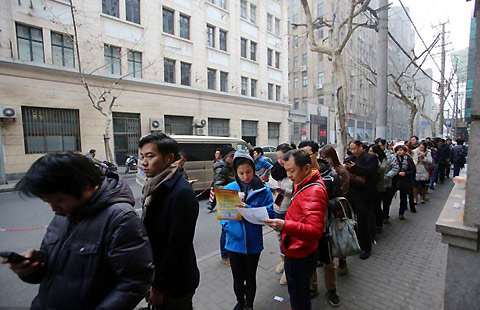Foreign players keep faith in China's A-share market
By Xie Yu in Hong Kong (China Daily) Updated: 2015-02-07 08:01Official data show the Shanghai-Hong Kong Stock Connect, a program launched in November to give direct equity market access to both individual and institutional investors, has managed to increase capital inflow into the Shanghai market over the past month.
Thursday and Friday saw 3.8 billion yuan and 1.5 billion yuan, respectively, of net capital inflow into Shanghai, making a total of 38.6 billion yuan over trading in the past 24 days, according to official data.
"Many of our investors believe the loose monetary environment will last and some share prices at this point are attractive," Wang said.
Kinger Lau, an analyst with Goldman Sachs Group Inc, wrote in a note on Thursday that the RRR cut, together with other liquidity injections conducted by the central bank in the past several weeks, "seems to have sent a strong signal that policymakers are committed to safeguarding growth and combating deflationary risk, rather than worrying about the potential overheating in the financial markets".
Lau said while this may increase risk appetite in the short term, especially for A shares, and Goldman considers "any correction as a strategically sound buying opportunity".
Analysts said investors, however, remain wary too of ongoing corporate governance risk for Chinese corporates as the government's anti-corruption probes continues to broaden.
Executives from six State-owned companies have been accused of taking bribes, seeking sexual favors for contracts, funneling cash to relatives or using public money to fund banquets and overseas trips.
Those from China United Network Communications Group Co, Shenhua Group Corp and China Huadian Corp are included in the list, according to the official website of the Central Commission for Discipline Inspection of the Communist Party of China.
Shares in China Unicom dropped by 4.2 percent in Shanghai, China Huadian lost 5 percent in Shanghai, and 4.9 percent in Hong Kong, while Shenhua lost 3.4 percent in Shanghai and 1.7 percent in Hong Kong.
- Vice Premier encourages Yangtze River economic belt
- China's critical illness insurance benefits 1m patients
- China may continue targeted bank reserve policies: official
- China gold consumption plunges 24.7% in 2014
- Private health insurance set to boom
- January economic data too murky to declare rocky spell
- China's first electric plane ready for sale
- CICC may bring in Bi Mingjian to regain shine

















